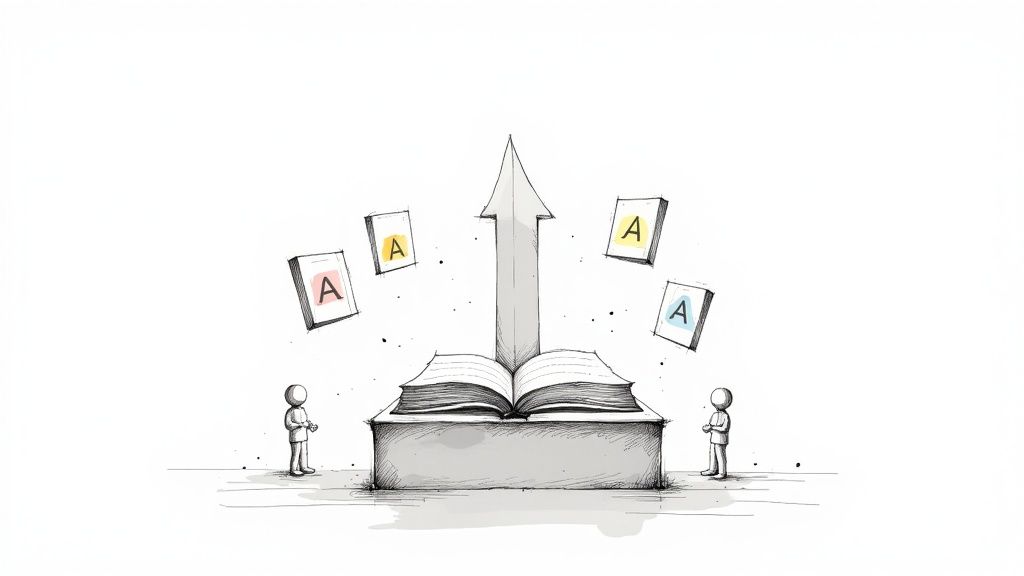7 AI Writing Tools That Save Authors 30+ Hours (2026 Guide)

✍️ Part of the AI Publishing Workflow: This article focuses on essential writing tools for authors. For the complete end-to-end publishing process—from writing through marketing—check out our Complete Guide to AI-Powered Book Publishing.
7 Must-Have AI Writing Tools for Authors
AI is revolutionizing the writing world, offering authors innovative solutions that enhance productivity and creativity. Recent studies suggest that nearly 70% of writers who integrate AI tools for writing experience notable boosts in efficiency. Yet, traditional challenges like writer's block, time constraints, and ineffective book marketing still persist. Authors often struggle to maintain momentum while juggling content generation and self-publishing tasks. Enter AI writing assistants, which are now designed to tackle these issues head-on by providing real-time feedback, content suggestions, and even strategic self-publishing tips—all essential for crafting compelling narratives and successful book marketing. This guide explores seven must-have AI writing tools for authors that not only streamline the creative process but also help overcome common hurdles, setting the stage for actionable tips and insights that will transform your writing journey.
What are AI Writing Tools for Authors?
AI writing tools for authors are advanced software applications that leverage artificial intelligence to streamline the writing process. These tools are designed to assist writers by generating content ideas, suggesting plot developments, and even making whole paragraphs of text. At their core, AI writing tools use natural language processing to analyze context and generate human-like language, making them invaluable for various stages of content creation, from brainstorming to editing.
For a more comprehensive analysis with detailed reviews, pricing comparisons, and specific use cases for 15+ AI tools, check out our complete guide to the best AI tools for authors.
One of the most significant benefits of using AI tools for writing is their ability to increase efficiency. For example, authors struggling with writer's block can quickly produce drafts or outlines with a simple prompt. In addition, these tools offer robust editing capabilities, providing grammar checks, style suggestions, and vocabulary enhancements that refine the overall quality of the manuscript. According to recent studies, writers utilizing AI assistants can reduce their editing time by up to 30%, allowing them to focus more on creativity and storytelling.
Moreover, AI writing tools are not just beneficial for the writing process; they also play a key role in book marketing and promotion. By generating optimized content for blogs, social media, and email campaigns, these tools help writers reach a broader audience and boost their online presence. Self-publishing authors, in particular, have found success incorporating these techniques alongside self-publishing tips from platforms like ManuscriptReport.com. Their data-driven insights provide a competitive edge in an increasingly digital marketplace.
As technology continues to evolve, AI is reshaping traditional publishing methods. Authors can now seamlessly integrate innovative technology into their creative workflow, enhancing both writing quality and marketing effectiveness. With regular updates and improvements, AI writing tools for authors have become essential companions in the modern publishing landscape—empowering writers to create, refine, and promote their work more efficiently than ever before.

7 Essential AI Writing Tools Every Author Should Consider
1. ManuscriptReport.com - The Complete Manuscript Analysis Tool
ManuscriptReport.com stands out as a specialized AI tool designed specifically for authors seeking comprehensive manuscript analysis. Unlike general-purpose AI writing assistants, this platform delivers detailed book reports including summaries, synopses, blurbs, comparable titles, SEO keywords, and marketing templates—all in approximately 10 minutes. Authors can upload their manuscripts and receive actionable insights that not only improve their writing but also streamline their marketing efforts.
Key features include:
- Automated book summaries and synopses generation
- Detailed Target Audience and suggestions on where to reach it
- Targeted SEO keyword suggestions and word cloud analysis for book marketing
- Comparable title analysis and market positioning
- Repurposing a book into a blog series focused on key themes, narratives, or characters
- Extracting memorable social media posts with eye-catching images
For self-publishing authors especially, ManuscriptReport.com eliminates hours of marketing preparation work, allowing more time for actual writing. The platform's specialized focus on book analysis makes it an invaluable resource for authors looking to refine their manuscripts and enhance their marketing strategy simultaneously.
2. Grammarly - The Essential Editing Assistant
Grammarly has evolved beyond simple grammar checking to become a comprehensive AI writing assistant. Using advanced natural language processing, it analyzes text for grammar, spelling, punctuation, clarity, engagement, and delivery. The AI provides real-time suggestions as you write, helping authors maintain consistent quality throughout their manuscripts.
Subscribe & Get Your Free Marketing Plan Template
Receive regular updates on marketing best-practices, AI shortcuts, and get our proven 4-phase marketing roadmap for free.
Unsubscribe anytime.
What sets Grammarly apart is its ability to adapt to different writing styles and genres. Authors can set goals for their writing—including audience, formality, domain, and tone—and receive tailored suggestions that align with their specific needs. The premium version offers advanced features like full-sentence rewrites, tone adjustments, and plagiarism detection.
Studies show that writers using Grammarly experience up to 74% fewer grammatical errors and a 20% improvement in writing clarity. For authors juggling multiple projects, this tool ensures consistent quality across all written content, from manuscripts to marketing materials.
3. ProWritingAid - The Deep Analysis Tool
ProWritingAid offers authors an in-depth analysis of their writing that goes beyond basic grammar and spelling checks. This AI-powered platform examines writing style, sentence structure, word choice, readability, and more through over 20 different reports. For authors working on longer manuscripts, ProWritingAid's ability to analyze entire documents makes it particularly valuable.
The tool excels at identifying patterns in writing that might otherwise go unnoticed, such as overused words, passive voice, or repetitive sentence structures. Its style suggestions help authors develop a more engaging and readable narrative, while its integration with popular writing platforms like Microsoft Word, Google Docs, and Scrivener streamlines the editing process.
Speaking of writing platforms, pairing your AI editing tools with robust organizational software maximizes your workflow efficiency. If you're exploring alternatives to Scrivener, check out our comprehensive guide to Scrivener alternatives, covering both free and paid options for manuscript organization.
ProWritingAid also offers genre-specific guidance, making it especially useful for fiction writers looking to adhere to genre conventions while maintaining their unique voice. Authors report a significant improvement in manuscript quality after implementing ProWritingAid's suggestions, with many noting enhanced reader engagement as a result.
4. Sudowrite - The Creative Writing Partner
Sudowrite represents the cutting edge of AI-assisted creative writing. Designed specifically for fiction authors, this tool helps overcome writer's block by generating creative content based on your existing writing. Unlike more general AI writing tools, Sudowrite specializes in narrative development, character dialogue, and descriptive passages that maintain the author's unique style.
Key features include:
- "Expand" function that develops scenes from brief descriptions
- "Describe" tool that enhances sensory details in settings
- "Brainstorm" capability for plot development and character arcs
- "Rewrite" option that offers alternative versions of existing passages
Many published authors credit Sudowrite with helping them push through difficult sections of their manuscripts or exploring narrative possibilities they hadn't considered. The tool's ability to generate content that feels cohesive with an author's existing work makes it particularly valuable for maintaining productivity without sacrificing creative control.
5. Jasper - The Versatile Content Generator
Jasper (formerly Jarvis) offers authors a versatile AI writing assistant capable of generating various types of content. While many authors use it primarily for marketing materials, Jasper's capabilities extend to creative writing, blog posts, and even full-length book sections. The platform's templates for different content types make it easy to quickly generate material for specific purposes.
What distinguishes Jasper is its ability to adopt different tones and writing styles. Authors can input examples of their writing, and the AI will generate content that matches their voice. This feature is particularly useful for maintaining consistency across different marketing channels or when collaborating with co-authors.
Jasper also integrates with other tools like Grammarly and Surfer SEO, creating a comprehensive writing ecosystem. For authors managing both creative writing and marketing efforts, Jasper provides a one-stop solution that reduces the time spent switching between different platforms.

6. Scrivener with AI Integration - The Organizational Powerhouse
While Scrivener itself is not an AI tool, its ability to integrate with various AI writing assistants makes it a powerful combination for authors. Scrivener provides unparalleled organizational capabilities for managing complex writing projects, and when paired with AI tools through plugins or copy-paste workflows, it creates an efficient writing environment.
Authors can use Scrivener to structure their manuscripts, research notes, and character profiles, then leverage AI tools for specific tasks:
- Draft sections in AI tools and import them into Scrivener's structure
- Export content from Scrivener to AI editing tools for refinement
- Use AI-generated outlines as the foundation for Scrivener projects
- Maintain research databases enhanced by AI-generated content
This hybrid approach allows authors to benefit from both Scrivener's organizational strengths and the creative assistance of AI tools. Many professional authors report that this combination has transformed their writing process, allowing them to complete manuscripts more efficiently without sacrificing quality or creative control.
7. Publisher Rocket - The Market Research Assistant
Publisher Rocket uses AI and data analysis to help authors make informed decisions about book marketing. While not a writing tool in the traditional sense, it provides crucial insights that can shape an author's writing and marketing strategy from the earliest stages of book development.
The platform offers:
- Keyword analysis for Amazon and other online bookstores
- Competition analysis for specific book categories
- Profitable keyword identification for ads and metadata
- Sales trend data to identify market opportunities
By understanding market trends and reader preferences before and during the writing process, authors can create books that resonate with their target audience. Publisher Rocket's data-driven approach complements the creative insights from tools like ManuscriptReport.com, giving authors a comprehensive view of both the creative and commercial aspects of their work.
Authors who use Publisher Rocket report making more informed decisions about book titles, subtitles, and even content focus, resulting in improved discoverability and sales performance.

How to Choose the Right AI Writing Tool for Your Needs
Selecting the ideal AI writing tool begins with understanding your unique challenges as an author. For instance, emerging writers may struggle with generating engaging content and identifying impactful SEO keywords, while seasoned authors look for advanced features that streamline editing and marketing tasks. As a result, it is crucial to assess your specific needs before choosing an AI tool.
When evaluating AI writing tools for authors, key features to consider include robust content generation capabilities, SEO keyword suggestions, and versatile template support. Many tools now offer intelligent content generation that mimics your writing style, ensuring consistency across chapters or articles. In addition, built-in SEO keyword research can help boost discoverability—a factor that has been shown to increase online engagement by over 50% in some reported cases.
A useful example of such a specialized tool is ManuscriptReport.com. This platform offers comprehensive book reports that include summaries, synopses, blurbs, comparable titles, and even targeted marketing templates. Designed with self-publishers and indie authors in mind, it provides results in roughly 10 minutes, letting authors spend less time on marketing and more on what truly matters—their books.
Comparing popular AI tools reveals that while some concentrate solely on writing assistance, others integrate marketing optimization into the writing process. Ultimately, choosing an AI writing tool that aligns with your specific workflow and objectives can enhance both your creative output and book marketing efforts. By understanding your needs and evaluating tool features carefully, you can find the perfect solution to elevate your writing and reach a wider audience.
Step-by-Step Guide: Integrating AI Tools into Your Workflow
Step 1: Begin by defining your creative goals. Outline the themes, target audience, and key messages you want your book to convey. Establishing a solid foundation helps maintain your unique voice as you integrate AI into your workflow. Trusted resources like Reedsy offer excellent guidance on goal setting and process refinement, ensuring you're well-prepared for the AI-powered journey.
Step 2: Use AI tools for brainstorming. Leverage AI writing tools for authors to generate fresh ideas and explore creative pathways you might not have considered. For instance, feed your initial concept into an AI assistant to produce suggestions for plot twists, character development, or setting details. This not only streamlines the ideation phase but also provides a diverse range of options to jumpstart your creative process.
Step 3: Transition to drafting your manuscript. Allow AI tools for writing to create rough drafts quickly, laying out structural elements such as chapter outlines and key dialogue segments. By handling repetitive or straightforward sections, AI frees up time for you to develop complex narrative arcs and maintain creative control over character depth and emotional tone.
Step 4: Enhance your manuscript refinement with AI-based editing tools. Use these assistants to polish your writing, correcting grammar, refining sentence flow, and achieving a consistent tone throughout the text. AI editing tools can act as a valuable second set of eyes, highlighting areas that might benefit from further creative nuance.
Step 5: Generate marketing materials using AI strategies. AI tools can efficiently create compelling synopses, blurbs, and promotional content that resonate with your target audience. Services like ManuscriptReport.com offer comprehensive book reports—covering summaries, comparable titles, SEO keywords, and more—in roughly 10 minutes. This streamlines the book marketing process, allowing you to concentrate on writing while spending less time on promotional tasks.
Step 6: Balance creative control with AI assistance. Regularly review all AI-generated content to ensure it aligns with your original vision. Maintain iterative refresh cycles where you make revisions to blend AI enhancements with your creative insights, ensuring that your manuscript remains authentic and engaging.
By following these actionable steps, you can effectively integrate AI writing tools for authors into your workflow, leveraging technology at every stage—from brainstorming and drafting to editing and marketing—while preserving your essential creative spirit.
Frequently Asked Questions
How do AI writing tools improve my writing process?
AI writing tools for authors streamline the creative process by automating content creation and editing tasks. These tools generate fresh ideas, refine prompts, and improve overall manuscript quality. For example, many users report a 30% reduction in writing time thanks to AI-assisted workflows. By providing analytical insights and real-time suggestions, writing assistants boost productivity and ensure error-free drafts. Additionally, platforms like ManuscriptReport.com integrate features for organizing book marketing materials and self-publishing tips. Authors benefit from a simplified workflow that tackles writer's block and delivers consistent content generation, ultimately transforming ideas into polished, engaging narratives. Harness these AI tools to excel.
Can AI tools really help with book marketing?
AI writing tools for authors streamline book marketing by generating compelling marketing materials, such as blurbs and press releases. Many authors report that AI-crafted content boosts online visibility, with studies showing a 30-50% increase in audience engagement. For instance, platforms like ManuscriptReport.com simplify the creation of persuasive promotional content by offering tailored self-publishing tips. These sophisticated tools not only save time but also align marketing messages with current trends. By leveraging AI-driven content generation, authors can elevate their promotional strategies and enhance overall book marketing efforts. These advancements empower authors to reach broader audiences quickly with measurable success.
Are AI writing tools easy to integrate into my existing workflow?
Integrating AI writing tools into your workflow may seem daunting, but many authors experience seamless adoption with minimal disruption. Begin by incorporating one tool to complement your current practices, evaluating its benefits before expanding usage. According to recent studies, 65% of writers report improved efficiency after transitioning to AI-supported processes. For step-by-step guidance and self-publishing tips, platforms such as Reedsy provide excellent resources. These templates, tutorials, and expert advice help address concerns about technology adoption, ensuring that book marketing, content generation, and overall writing productivity can flourish with minimal effort. Experience the efficiency boost as you simplify your creative process.
Conclusion: Transform Your Writing with AI
The seven AI writing tools for authors highlighted in this article represent the cutting edge of technology designed to enhance creativity, productivity, and marketing effectiveness. By automating tasks like content generation, keyword optimization, and synopsis development, these tools let you concentrate on what matters most: your writing. In fact, authors using AI solutions report up to a 30% reduction in marketing time, which translates into more hours for crafting compelling narratives.
From comprehensive manuscript analysis with ManuscriptReport.com to advanced editing with Grammarly and ProWritingAid, creative assistance with Sudowrite, versatile content generation with Jasper, organizational power with Scrivener integrations, and market research with Publisher Rocket—each tool addresses specific needs in the author's journey.
This streamlined approach not only enhances productivity but also provides fresh insights into audience targeting and competitive analysis. Experimenting with a mix of these AI tools for writing can uncover unique benefits suited to your individual needs, from generating ad copy to refining your manuscript. Ultimately, embracing AI means spending less time on marketing logistics and more on creative innovation. Explore these solutions and transform your approach to writing. Now is the time to let AI enhance your workflow and help you reach your full authorial potential. Make the shift today and experience creative freedom backed by smart, efficient technology that builds your literary legacy.
Enjoyed this article? Subscribe for more + get a free marketing roadmap template.
Receive regular updates on marketing best-practices, AI shortcuts, and get our proven 4-phase marketing roadmap template for free.
Unsubscribe anytime.
Related Articles

The Ultimate Affordable Book Launch Checklist: 9 Essential Steps for 2026
Complete affordable book launch checklist for 2026. Follow 9 proven steps—from budget planning to post-launch—for indie and self-published authors. Launch successfully for under $500.

How to Write Viral Book Hooks: 10 Proven Strategies for Social Media Success
Master the art of viral book hooks with 10 proven strategies, platform-specific tactics, and templates that grab attention on BookTok, Instagram, and beyond.

How to Advertise a Book on Amazon and Attract Readers
Learn how to advertise a book on Amazon effectively. Discover strategies to optimize your ads, increase sales, and reach more readers today.